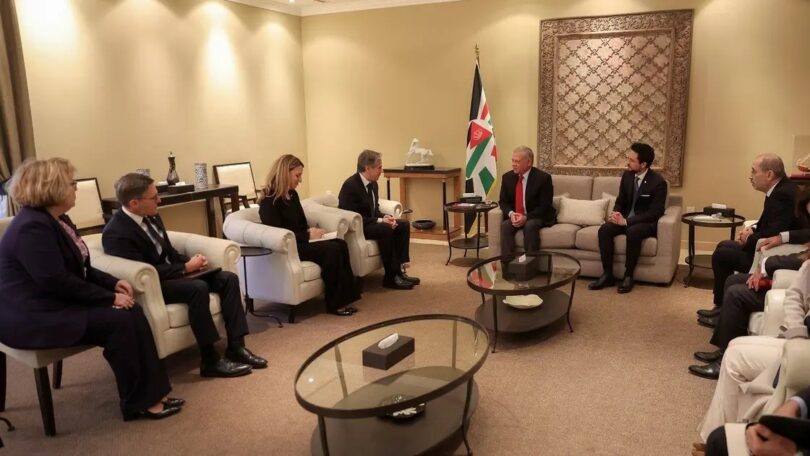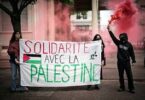AMMAN (Reuters): US Secretary of State Antony Blinken assured Jordan’s King Abdullah on Sunday that Washington opposes the forcible displacement of Palestinians from Gaza or the occupied West Bank, as he hoped to kickstart talks on Gaza’s future.
The King had raised Jordan’s concerns over displacement in the meeting, according to a palace statement, as Israel pushes on with its military campaign that has turned much of Gaza to rubble and left its 2.3 million residents on the verge of starvation, according to aid workers.
In his meeting with King Abdullah in Amman, Blinken “stressed US opposition to forcible displacement of Palestinians from the West Bank and Gaza and the critical need to protect Palestinian civilians in the West Bank from extremist settler violence,” State Department spokesperson Matthew Miller said in a statement.
Most of Gaza’s residents have been displaced by the conflict, and violence has also flared in the West Bank, including in a deadly clash in the city of Jenin on Sunday.
King Abdullah told Blinken that Washington had a major role to play in pressuring Israel into an immediate ceasefire, and warned of the “catastrophic repercussions” of the continuation of the war in Gaza, which began when Hamas attacked Israel on October 7, killing 1,200 people and taking 240 hostage.

Israel’s subsequent air and ground assault had killed 22,722 Palestinians by Saturday, according to Palestinian health officials.
Blinken is touring the region amid heightened fears Israel’s offensive against Palestinian Hamas militants in Gaza will spark a broader regional conflagration.
The trip comes after a drone strike in Beirut killed a senior Hamas leader and Israel exchanged fire with Iran-backed militia Hezbollah across its northern border with Lebanon. Washington is also rallying allies to deter attacks on Red Sea shipping by Houthi militants who control most of Yemen.
Blinken arrived in Jordan late on Saturday and met King Abdullah on Sunday before traveling to Qatar for meetings with Emir Sheikh Tamim bin Hamad al-Thani and Prime Minister Mohammed Bin Abdulrahman al-Thani, who also serves as foreign minister.
In Doha, Blinken will discuss efforts to free the more than 100 hostages still believed to be held by Hamas after an earlier agreement mediated by Qatar broke down, a senior State Department official said.
Blinken will end the day in the United Arab Emirates.
Washington wants Israel’s Arab neighbors to play a role in reconstruction, governance and security in Gaza in expectation that Israel’s assault will eliminate Hamas, which has run the territory since 2007.
The US delegation aims to gather Arab states’ views on the future of Gaza before taking those positions to Israel, the US official said, acknowledging that stances would be far apart.
Humanitarian crisis
In a camp for displaced people in Rafah, southern Gaza, some Palestinians called on Blinken to live up to US calls for a two-state solution to the conflict.
“We hope that it is a visit for our benefit, for peace’s benefit and for the benefit of establishing a Palestinian state next to a Jewish state, in line with UN resolutions … and with what America has been calling for,” said Moussa al-Atawneh, a 76-year-old displaced man.

In Amman, Blinken visited a World Food Program (WFP) warehouse storing canned food bound for Gaza.
WFP acting country director for Palestine Laura Turner said ahead of meeting Blinken that he should push to halt the conflict and for Israel to open border crossings into northern Gaza.
“That’s where the population is that we haven’t been able to access for six weeks and we’re most concerned about,” Turner said, adding that aid sent north from southern Gaza was being taken en route by other Palestinians also in dire need of food.
Blinken said the US was working to keep aid routes into the strip open and to multiply them.
“We are intensely focused on the very difficult and indeed deteriorating food situation for men, women and children in Gaza, and it’s something we’re working on 24/7,” Blinken said.







